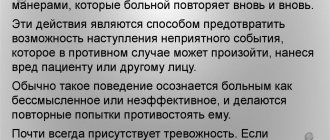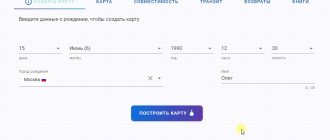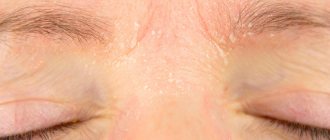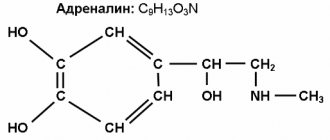Before you understand how panic attacks are treated, you should understand what kind of disorder it is, the reasons for its development, who is susceptible to it, and what the symptoms are.
The human body responds to stress by releasing the hormone adrenaline. It triggers a mechanism that prepares the body to confront a dangerous situation or escape: the heart begins to beat faster, breathing quickens. This leads to increased ventilation of the lungs and, as a result, the level of carbon monoxide in the blood decreases, causing dizziness, tingling in the fingers, numbness of the arms and legs.
Nature initially instilled in people just such an algorithm for responding to danger, so this is quite normal and characteristic of all representatives of homo sapiens. However, if such a mode “turns on” for no reason, then this will already be a manifestation of a panic attack, which is a mental disorder - one of the subtypes of anxiety conditions.
Types and causes of the disease
There are quite a lot of people in the world who are susceptible to panic attacks - up to 5% (most of them are women between 20 and 30 years old).
There are 3 types of panic attacks:
- spontaneous – sudden, appears without any obvious reason;
- situational - occurs in anticipation of a certain situation or directly during its course (before an exam, in anticipation of a conflict or directly during its course, etc.);
- conditional-situational - the impetus is a biological or chemical activator (change in hormonal levels, ingestion of alcoholic beverages, drugs, alcohol.
The following factors contribute to the occurrence of panic attacks:
- Genetic predisposition, that is, the disorder is transmitted with genes. In this case, it will be very difficult to cope with it and will take a long time.
- The presence of phobias, that is, fear of something.
- Poor monotonous diet, lack of vitamin B in the body.
- Significant event (wedding, birth of a child, death of a loved one, etc.)
- Certain diseases, inflammatory processes, hypoglycemia (low blood sugar), hyperthyroidism (activation of thyroid function), post-traumatic syndrome.
- Self-doubt, personal problems, failures in life.
- Having bad habits.
- Wrong lifestyle.
- Internal conflict.
- Depression.
- Taking strong antibiotics that have multiple side effects or are addictive.
- Withdrawal syndrome – refusal of alcohol. Such “withdrawal” often leads to nervous breakdowns and excessive anxiety.
- Hyperventilation syndrome from the habit of breathing deeply - this disrupts the balance of carbon and oxygen, which leads to the consequences mentioned above.
- Taking stimulants or narcotics, caffeine, antidepressants, or medications the simultaneous use of which is undesirable.
- Serious cardiovascular diseases that can lead to death. The person realizes this and at the slightest deterioration of the condition begins to panic.
- Consequences of very high physical or sports activities.
- Hormonal changes in the female body - pregnancy, before menstruation, menopause.
Conclusion
Panic attacks are often unreasonable fear and anxiety that arise under the influence of some traumatic factor on a person. The attack itself is not dangerous, but against the backdrop of uncontrollable fear, a person can commit rash acts, and frequent disorders disrupt his life. A constant feeling of fear and anxiety leads to insomnia, refusal to eat, severe exhaustion and exacerbation of chronic diseases. Panic attacks need to be treated and can be eliminated with psychotherapy, medication and lifestyle changes.
Signs of a panic attack
Many people, unfortunately, do not understand that they were “visited” by a panic attack, believing that their heart suddenly “grabbed”. Indeed, the symptoms of a panic attack are similar to a vegetative crisis: rapid heartbeat, pulsation in the temporal regions, lack of air - difficulty breathing, pain in the chest and abdomen. However, medications taken “for the heart” do not improve the condition in any way.
Also, at these moments, a person begins to either sweat or feel chills, his limbs tremble, the skin becomes numb or tingles, there may be dizziness and nausea, and an upset stomach. Everything seems unreal to him, blurry, that this is not happening to him (derealization and depersonalization), he goes crazy or dies. The patient experiences incredible fear, but there are also individuals who, instead, feel sadness; they always want to cry or be aggressive.
We can talk about the presence of a mental disorder such as panic attack syndrome if attacks occur several times a day or a couple of times a month, and last several minutes or up to an hour (the average is from 15 to 30 minutes).
The attack appears unexpectedly, without any pretext, and not in some frightening or alarming situation: in a store, on the street, in a cinema, while driving a car, at home - on the sofa, and even in a dream. A person at this moment can either be among people or be alone.
It can hardly be said that all of the above is dangerous to health, but panic attacks can lead to the development of neuroses, depression, and phobias. A patient, having experienced an unexpected attack, even a very short one, several times, tries to do everything to avoid a recurrence. He becomes suspicious, loses confidence, constantly “listens” to himself, gets nervous and tries to avoid places and situations where and in what case this happened. That is, now he is afraid of just such an attack and lives in constant anxiety and phobic avoidance.
The mechanism of the onset of panic disorder is very simple to explain using an example. A completely prosperous person, usually a strong personality, living a normal life, received a very strong emotion (anger, fear, etc.) in a certain traumatic situation. The brain absorbs this experience and stores it in the unconscious. That is, the individual himself seems to have forgotten everything, but this is far from the case: the negative is securely stored in a distant corner of the memory and, over time, added to it are memories of the troubles that inevitably accompany our life, no matter how wonderful and calm it may be .
One fine day, some significant event happens, very joyful or sad (the birth of a child, the death of a parent), and it, by coincidence, becomes the last straw that overflows the vessel with memories. Then it “explodes” and the person has a panic attack.
This sudden attack worries and worries a person, even if it passed very quickly. Such a lack of understanding of what happened, anxiety, tension and excess emotions about this can provoke another attack, and then they will happen again and again. The patient is frightened by his physical and mental state at these moments, he tries not to visit those places where he was overtaken by an attack - phobias appear. As a result, panic disorder develops, and if this problem is left to chance, the consequences can be very sad.
Symptoms
The main difference between a panic attack and any other type of anxiety disorder is its sudden and irrational occurrence. This can happen in any circumstances. But subsequently there is a fear of their development in those places or in those situations in which episodes of panic have previously occurred. As a result, a person begins to avoid getting into such circumstances, which can become frightening. In some cases, people lock themselves at home and even refuse to eat, fearing a second attack.
Panic attacks can occur with varying frequencies from once a week to once every 6 months.
The manifestations of a panic attack are quite varied. But all of them can be divided into mental and physical. Panic sets in abruptly, with mental symptoms initially appearing. Patients say that in such situations, dozens of frightening thoughts instantly appear in their heads, they get confused, and after just a few minutes they often cannot even accurately describe what caused the fear. At such moments there are:
- anxiety;
- a feeling of irresistibly impending danger;
- fear of death, madness;
- feeling of a lump in the throat;
- inability to focus on one object;
- a feeling of unreality of what is happening.
This can lead to a strong desire to run and hide or, on the contrary, drive the patient into stupor. This is accompanied by the manifestation of physical symptoms, which are more pronounced in the presence of abnormalities in the functioning of internal organs:
- increased heart rate;
- trembling in hands;
- pallor;
- hot or cold flashes, especially in the face and neck;
- discomfort, tightness, or pain in the chest;
- dry mouth;
- numbness or tingling sensation in the arms and legs;
- sweating;
- increased breathing (shortness of breath), feeling of suffocation;
- abdominal discomfort caused by reflex indigestion and diarrhea;
- weakness, dizziness.
At the same time, all the symptoms quickly, like an avalanche, gain intensity and within a few minutes completely capture the person’s consciousness. If more than 4 symptoms are present, a panic attack is considered to be a full-blown panic attack; otherwise, it is said to be a minor or abortive attack. At the same time, the same person often alternates between large and small anxiety attacks.
Panic attacks can happen both during the day and at night. Moreover, it has been noted that night attacks are most typical for strong-willed people who know how to control their emotions during the day. And since self-control disappears at night, suppressed fears and worries manifest themselves in the form of a sudden attack of anxiety.
The severity of symptoms increases with emotional or physical stress, against the background of fatigue, especially with chronic lack of sleep, use of psychostimulants, coffee, and alcohol. On the contrary, high-quality, complete rest and emotional calm lead to easier attacks.
Thus, panic attacks directly do not pose a serious threat to a person’s life, but they sharply reduce its quality and can even lead to loss of performance and isolation. Therefore, it is important to consult a doctor if you experience attacks of fear and anxiety, especially in combination with the other symptoms described above.
Why panic attacks need to be treated
The syndrome may not appear too often: the interval between attacks can be quite significant, but sooner or later, the panic will return anyway, that is, nothing will go away on its own.
The consequences of this are:
- Since a panic attack can take you by surprise at any time, in any place, in public, the person suffering from the disorder begins to avoid loved ones, friends, does not go anywhere, and withdraws into himself.
- Various phobias develop - fear of open space, darkness, phenomena, i.e. anything.
- Psycho-emotional disorder leads to personality disorder.
- Self-doubt develops, which affects personality, appearance, family relationships, and professional activities.
- Sleep is disturbed, appetite is lost, and the body becomes dehydrated. As a result, the body suffers.
- Refusal to share problems causes problems in the nervous system.
It is imperative to get rid of this problem, since, judging by the above, it brings problems in social adaptation, worsens the quality of life, interferes with normal work, and negatively affects the physical and mental state.
Consequences
Panic attacks significantly worsen a person’s quality of life and, if left untreated, can cause the following complications:
- self-isolation, fear of society, interruption of contacts with other people;
- decreased self-esteem;
- loss of confidence in the future;
- wariness, anxiety, which can provoke aggression towards the environment;
- sexual dysfunction;
- the formation of mental disorders with frequent repetition of attacks;
- conflicts in the family;
- problems at work, study;
- abuse of alcohol and drugs to combat panic;
- exacerbation of chronic diseases;
- disorders of the digestive tract, dystrophy due to refusal to eat due to anxiety;
- fear of death.
Who to turn to for help and how to diagnose
Poor awareness among people about panic disorder leads to the fact that some consider it completely frivolous, while others consider it a dangerous incurable mental illness. Therefore, they believe, you should not go to doctors: in the first case there is no need, and in the second the main role is played by the fear of being branded as mentally ill. Both opinions are completely unfair: it is both very serious and completely controllable and treatable. A competent approach will allow you to successfully and fairly quickly get rid of the problem.
First of all, you need to understand that you need to contact only experienced, highly qualified specialists - a psychiatrist, who will develop treatment tactics based on the causes of a panic attack, because they are the ones that need to be eliminated. The doctor will determine why the patient’s nervous system could not withstand the load and malfunctioned in the form of panic manifestations.
The doctor must carefully examine the patient to establish an accurate diagnosis and study the symptoms. The selection of therapy is made based on the characteristics of the patient’s body on an individual basis. The work of a professional consists not only of recommendations and prescribing certain medications, but also of carefully monitoring the progress of treatment and, if necessary, its correction.
As for the psychologist, such a specialist is useless in this case - he is not able to identify the causes of the pathological disorder and prescribe medication and psychotherapeutic treatment, which, in case of getting rid of this problem, are necessary. The picture is the same with sorcerers, psychics and “wise” advisers from the Internet - they will only bring harm to the patient, which is then quite difficult to correct, aggravating his not the best condition.
The psychiatrist, first of all, will seek advice from a cardiologist, therapist, endocrinologist, neurologist, or psychotherapist. This is necessary to exclude the presence of somatic and serious mental illnesses.
It should immediately be noted that a therapist in ordinary clinics does not have the opportunity to carefully and competently examine the patient. In addition, long queues and the nervous atmosphere in them often serve as an impetus for another panic attack, and the person generally loses all desire to be treated.
In specialized paid clinics, such a picture is not observed: any person who comes here receives great attention. In addition, it is usually comfortable; highly qualified doctors work here, “armed” with advanced techniques and equipment for accurate diagnosis and successful treatment. The latter implies the use of pharmacology, psychotherapy, physiotherapy in combination, as well as changing the usual lifestyle.
The attitude of the patient himself to the treatment of panic attacks is also important - he must understand his problem, that this, in essence, is not a disease at all, but a sign of a disorder of higher nervous activity. For a successful result, you need the desire and good will of the patient, compliance with all the doctor’s recommendations.
Summarize
A person can experience panic attacks at any age.
Neither social status, nor income, nor good living conditions guarantee the absence of anxiety and the likelihood of developing a panic attack.
A panic attack is a pathology that can occur for various reasons and is of a purely individual nature. Therefore, the approach to treatment will be different for each person. The main thing is to seek qualified help from a psychologist or psychotherapist in time, and not let the disease take its course.
Drug therapy
Certain medications can help reduce some of the symptoms of a panic attack. If the patient’s brain has a disturbance in the exchange of neurotransmitters, the balance of the processes of excitation and inhibition, then they are prescribed much more than in milder cases.
At the first stage, medications relieve the attack, and then restore the functioning of various brain systems. They are able to eliminate the panic state altogether, or weaken it.
- Tranquilizers are prescribed at the very beginning of treatment and not for long, as they cause addiction. These drugs extinguish the severity of the attack, stabilize the autonomic system, and normalize sleep.
- Antidepressants require caution - you need to be careful about their contraindications, so the selection is strictly individual. It is interesting that similar products from different manufacturers can have different effects on the patient.
- Antipsychotics are used extremely rarely - only if panic disorder cannot be cured with other medications, as well as in the presence of a personality disorder or metabolic disorders in the brain. In addition, they are very difficult to find.
- Neurometabolic drugs are very active, so they are used strictly in courses and administered in the presence of a doctor. They allow you to reduce the doses of other psychotropic drugs.
It is necessary to emphasize once again that all of the above medications are prescribed personally. The doctor should pay special attention to their effect on the patient, especially in the first days, monitor the intake, cancel and re-prescribe in case of adverse events.
Psychology of panic
People's panic has the following characteristics:
- it occurs mainly in large groups (crowds, mass gatherings of people);
- provoked by a feeling of uncontrollable fear, caused by a real danger or based on an imaginary threat (for example, panic on an airplane);
— panic is most often a spontaneously arising phenomenon, manifested in the disorganized behavior of people;
— people in a state of panic are characterized by behavioral uncertainty, consisting of confusion, chaotic actions and inappropriate behavioral response in general.
Thus, panic of people is a spontaneously emerging phenomenon of a large crowd of people who are in a state of heightened emotional arousal due to the influence of an uncontrolled feeling of fear and horror.
It is known that anxiety and panic do not arise in every mass gathering of people. Decisive for the occurrence of such a condition is a combination of a number of conditions and the influence of various factors:
- a psychological atmosphere of increased anxiety and uncertainty of a group of individuals in situations of danger or due to prolonged experience of negative emotions (for example, living under conditions of regular bombing), such an atmosphere is considered pre-panic, that is, preceding and contributing to the emergence of a panic state;
- the presence of rumors that induce and stimulate a state of panic, for example, inciting the degree of negative consequences of the perceived danger;
— certain personal qualities of individuals and the presence of a tendency to panic.
Psychotherapeutic treatment
Panic attacks cannot be cured without psychotherapy using the following techniques:
1.Cognitive behavioral therapy is considered the most effective in this area - it is called the “gold standard”. The patient, with the help of a specialist, goes through several steps:
- changes your thoughts about panic to more positive ones;
- learns techniques that reduce anxiety;
- learns to overcome agoraphobia, etc.
This therapy models thinking and behavior during an attack. For example, the following situation is played out: you have a panic attack while you are driving a car. If you pull over and stop, will anything bad happen? Will you crash your car or die? Hardly! It is precisely this belief that the patient develops, and he ceases to be afraid of an attack.
2. Classic hypnosis involves putting the patient into a trance state, in which he is encouraged to get rid of panic disorder. This method shows good results, but not all people succumb to it.
3. Ericksonian hypnosis allows you to resolve internal conflicts. It is softer, since the person himself enters a trance with the help of a psychotherapist. Moreover, in this case it is believed that there are no non-hypnotizable people. In addition, the patient learns self-hypnosis, which helps him prevent panic attacks by reducing anxiety levels.
4. Body-oriented therapy is a whole set of methods that involve working with the body (by influencing it and regulating sensations, you can reduce the level of anxiety). This includes:
- breathing techniques;
- relaxation according to Jacobson.
5. Systemic family psychotherapy sees the cause of panic disorder in the family, in the relationships and disharmony existing there. That is, the patient’s condition depends on all members of his family, and therefore work is carried out with all of them.
6. Psychoanalyst sees the causes of panic attacks in unconscious conflicts - meaning feelings of guilt, problems with parents, internal aggression, etc. Therefore, the psychoanalyst will clarify these very conflicts for several years. It is this prolongation that is the disadvantage of this method.
Physiotherapeutic procedures such as:
- relaxing and tonic physical therapy;
- massage course;
- aromatherapy;
- mesodiencephalic modulation of the cerebral cortex (MDM therapy);
- electrosleep;
- color therapy.
During the course of treatment for PA, the patient may begin to doubt that it is happening correctly, that he needs psychotherapy and that it is truly successful, and that the medications have a positive effect. In addition, circumstances may turn out to be such that he violated the doctor’s recommendations and the prescribed regimen. At the same time, he may have a seizure. Therefore, the patient should not hesitate to ask for help or consult with his leading specialist. The latter will be ready at any time to answer all the patient’s questions both over the telephone and in a face-to-face meeting. Such communication, especially in the early stages, should be continuous.
help yourself
Early diagnosis and timely treatment allows you to completely get rid of panic attacks, of course, if they have become chronic. You can contribute to professional treatment at home or know how to relieve an attack and alleviate it, strengthen the body and eliminate negative factors.
The following folk remedies will help reduce fear:
- Pour 300 ml of boiling water over a teaspoon of dry oregano, leave for 10 minutes, strain. Drink 150 gr. four times a day.
- 100 gr. pour 500 ml of boiled water into young birch leaves. After infusion, strain for five hours. Take 100 ml every day.
- Infusion of linden or chamomile. Pour boiling water (a glass) over a teaspoon of dried inflorescences and after half an hour you can drink it as tea, having first strained it.
Motherwort juice is also good; alcohol tincture of oregano; decoctions of lemon balm and mint; infusions of valerian, wormwood, nettle, hops.
You can help an upset psyche by walking on grass or bare ground with bare feet (even in the cold season) - this calms you down.
Aromatherapy gives excellent results - candles with essential oils of pine, eucalyptus, juniper. A massage with these substances won't hurt either.
Experts advise drinking as little strong tea and coffee as possible, sitting less at the computer and in front of the TV, walking more in the fresh air, playing sports and being physically active. The day should be distributed correctly between time for work, rest and sleep. You need to monitor your diet - it should be rational and not contain spicy seasonings. Avoid bad habits (smoking, alcohol), take vitamins.
Those susceptible to panic attacks should adhere to the following rules:
- Don't be alone, don't isolate yourself. Communicate with family and friends, tell them about your condition - they will help you cope with it. Keep a diary, share your thoughts with him, analyze them, tune in to something pleasant.
- Relax more often - read, spend time in nature, watch a fun movie, take a bath, listen to good relaxing music, that is, have a good rest. You can learn to meditate and do it at home, in silence, in a calm environment.
- Learn to breathe correctly, master a breathing technique that reduces hyperventilation of the lungs and thus alleviates panic symptoms - through a paper or plastic bag. An excellent option is Pilates, that is, breathing exercises. Sign up for the section and practice it under the guidance of an experienced instructor.
- Gradually, with the help of training the nervous system, develop immunity to stress, do not engage in self-hypnosis of fear of anything, do not scold yourself.
- If the situation gets out of control, immediately contact a specialist.
- Set yourself up for positivity. When anxious thoughts appear, try to switch to something good.
Content:
- What is a panic attack?
- Causes of panic attacks
- What happens to the body during PA? Symptoms and signs of attack
- Stages of a panic attack
- PA in women
- Ways to help another adult or child
- Is it worth dealing with panic attacks?
What to do in case of a sudden attack
If you feel the onset of a panic attack, you can prevent it using the following recommendations:
- in the first seconds, the gas balance provoked by hyperventilation should be normalized. To do this, you need to breathe into cupped palms or a paper bag;
- you need to close your eyes, relax, think about something good. It doesn’t hurt to lie down and at least take a nap;
- switch to the process that was affected by the crisis and continue to carry it out. On the street, you can start counting people passing by, solving arithmetic problems in your head, etc.;
- start singing your favorite song loudly – cheerful, energetic. The most suitable option is a children's room;
- surging heat and clouded consciousness can be cooled and cleared in the shower or by washing the face and skin behind the ears with cold water. Next, you need to look at yourself in the mirror and try to catch the moment the attack recedes;
- drink a cup of hot tea with honey and lemon balm - this soothing drink will calm you down and make you fall asleep;
- Massage your ears or palms - press the membrane between your thumb and index finger and hold it there for a count of five. Do this until the fear passes;
- chew chewing gum, which you should always have with you. The brain will switch, the numbness and excitement will go away. At this moment, you should start doing some distracting but pleasant things;
- Having auto-training skills, you can repeat to yourself - nothing bad happened, there is no danger, everything will pass very quickly.
Recommendation for those who are close to a person who is in crisis: do not be nervous, but take him by the hands and in a very calm voice convince him that everything is fine and will end well.










